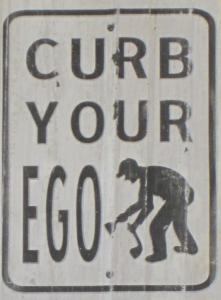
The love of money, avarice, is a root for all evil, for it takes us away from the foundation of what is good and just, that is, charity. The more we give into greed, the more we cut ourselves off from charity, and so the further we find ourselves from God. Without love, without charity, we are nothing.
The love of money, avarice, is the root of all evil, for it takes us away from the foundation of what is good and just, that is, charity. The more we give into greed, the more we cut ourselves off from charity, and so the further we find ourselves from God. Without love, without charity, we are nothing.
The more we give into avarice, the less charity we have, but it is never annihilated. As we continue to exist, we continue to have some good in us, and so we continue to have some charity in us. What little charity we have left can serve as the basis for our transformation; it can be the embers which we blow into to relight the flames of love. We must embrace that transformation, act against any and all inclinations of greed through acts of charity and justice; in doing so, we will find that we create the habits that will purify us of our avaricious nature, until, at last, we have become perfected in charity and that defilement has been entirely removed from our soul. Thus, St. Chromatius of Aquileia tells us:
If on the other hand someone is sick with avaricious greed, which weighs more heavily than any sickness of the soul, since “greed is the root of all evils” [1 Tim 6:10], as the apostle says, to such a person the precept concerning works of mercy is critical, that he may know that he cannot be healed in any other way than by going from being greedy to becoming charitable, generous from being covetous. [1]
Greed plants within us all kinds of evil inclinations. Once we move away from charity, we open ourselves to thinking about the world at large solely in relation to ourselves and our own wants and desires. It props up and encourages all the selfish, self-centered desires in us, suggesting that, because they are a part of us, they should be heeded. Unless we get ahold of and eliminate greed in our heart, we will create a view of ourselves based upon a dualistic “I” vs “everything else,” where we try to prop up that I through giving it everything it wants, whether or not it is actually good for us.
We should die to the self, but how can we do so if we keep establishing the ground for that self to grow? We cannot. And the more we let that ground remain, the more we let the deluded self develop, the more arrogant we will become, We will end up thinking so highly of ourselves, we will not accept that we can do any wrong; we will tell ourselves we should be free to do as we want, and what we want must be good because we are the ones who want it.
Why do we want what we want? What is the source of our desire? Is it from the purity of our hearts? So long as we prop up our deluded self above all others, it is not. The more we let greed and what arises from it direct our actions, the worse we will become, and so the more deluded we will become in regards the self. The more we let that delusional ego develop, the more we will have to do in order to die to the self and begin our reformation. This is why St. Salvian said, “Indeed, the greatest accuser of evil men is one who, in arrogance, takes advantage of innocence. Among many guilty of the same crimes none is more criminal than he who does not think himself guilty.” [2] So long as we prop up the self with arrogance, we will never be able to accept we have done wrong, and if we will not accept that we have done wrong, we will not reform ourselves.
This is why, no matter the sin, no matter the sinful inclinations, the foundation for our reform lies not just in treating the various sinful habits which we have developed, but rather, in dealing with the root of all that sin, in our lack of charity. We need to turn ourselves away from whatever selfish ideologies we have accepted as the basis for our understanding of the world around ourselves. We need to do more than think about the problem, we need to act on it. Even if consciously, we continue to have a mind established with such a false sense of the world, the more we seed charity in our soul by actually acting out in charity, the less ground such evil will have left in our souls, and so the easier it will be for us to deal with the bad habits which we have developed in our lives. But it must truly be acts of charity; charity wishes for and works for the good of the other, and so if it sees an unjust situation, it will work for the restoration of justice: those who have no interest in justice cannot act in charity; they might imitate charity, but they are only simulating it for the sake of appearances.
St. John Chrysostom tell us that those who give to the poor out of charity find that they are building up within themselves the treasury of the kingdom of God:
Surely, you must not think of giving alms to the poor as an expense but as a source of income. It is not an outlay of money but it is a profitable business. For you get back more than you give. You give bread and get back eternal life. You give a coat and get back a garment of immortality. You give your house to be shared and you get back a heavenly kingdom. You offer perishable things and you receive things which last forever.[3]
We must remember, such giving must be done out of true charity; we can’t take from the poor and then give them a very small, insignificant portion back to them, just enough to live, and think we have done good. Taking away from someone a hundred dollars and giving them a can of beans in return is not charity. We must be careful and not assume that just because we give to the poor, we prove ourselves to be charitable. This is why justice has to be a part of the equation; if we ignore justice, we will not be charitable. We must first fulfill the expectation of justice if we want to truly engage in and practice charity. This is why so much so-called charity is anything but charity – it only serves to keep an unjust system in place, giving the exploited just enough to survive while withholding from them what is justly theirs. If we have been guilty of such exploitation and we repent, we should do what we can to restore what we have unjustly taken from others: “But even if there is someone or other who is greedy, who snatches others’ goods, who casts out orphans and evicts widows, at least afterwards, after he has returned in repentance, let him return what he took.”[4]
We need love. We need to transform ourselves by love. All sin comes out of unlove. Certainly, we should take note of our sins, and stop ourselves from forming more sinful habits while we work to overcome the ones which we have already developed. But our focus in doing so must be at the root of the problem, which is our lack of love, our uncharity, our avarice or greed. Once we overcome the selfish, self-centered egotism which cuts up the world by the knife of the ego, we will be able to overcome the rest of our sinful habits.
[1] St. Chromatius of Aquileia, Sermons and Tractates on Matthew. Trans. Thomas P. Scheck (New York: Newman Press, 2018), 51 [Sermon 12].
[2] Salvian the Presbyter, “The Governance of God” in The Writings of Salvian the Presbyter. Trans. Jeremiah F. O’Sullivan (Washington, DC: CUA Press, 1962), 111.
[3] St. John Chrysostom, On the Incomprehensible Nature of God. Trans. Paul W. Harkins (Washington, DC: CUA Press, 1982), 216-17 [Homily 8].
[4] St. Ambrose, “On Noah” in Treatises on Noah and David. Trans. Brian P. Dunkle, SJ (Washington, DC: CUA Press, 2020), 92.
Stay in touch! Like A Little Bit of Nothing on Facebook.
If you liked what you read, please consider sharing it with your friends and family!













